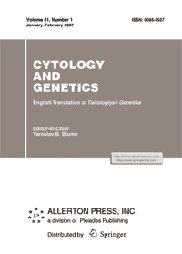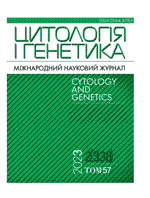Human exposure to radiation, such as cosmic and earth background radiation, industrial background radiation, as well as radiation caused by various human activities is known to trigger various intra and extracellular responses. It is also known that the radiation response and sensitivity is agedependent. Ubiquitin conjugates in murine blood serum were analyzed under normal and pathological conditions caused by irradiation across different age groups. Nonlinear white mice Mus musculus were used for tests. The source of radiation was 137Cs with dose rate 1Gy/min., due exposure 5min (LD50 5Gy) executed using the «GUPOS3M» gamma facility. Using immunoblotting for measurement data was statistically analyzed to unveil changes in ubiquitin conjugate levels following ionizing radiation and intraperitoneal ubiquitin administration. Agerelated variability in ubiquitin conjugates levels is identified, shedding light on ubiquitin injection role in modulating radiation responses across age groups. These findings hold implications for cellular biology and clinical radiation therapy, offering hope for future therapeutic interventions and enhanced radiation therapy outcomes.
Keywords: ubiquitin, ubiquitin conjugates, irradiation, response to radiation, agerelated differences

Full text and supplemented materials
References
Adjemian, S., Oltean, T., Martens, S., et al., Ionizing radiation results in a mixture of cellular outcomes including mitotic catastrophe, senescence, methuosis, and iron-dependent cell death, Cell Death Dis., 2020, vol. 11, p. 1003. https://doi.org/10.1038/s41419-020-03209-y
Akutsu, M., Dikic, I., and Bremm, A., Ubiquitin chain diversity at a glance, J. Cell Sci., 2016, vol. 129, no. 5, pp. 875–880. https://doi.org/10.1242/jcs.183954
Castañeda, C.A., Dixon, E.K., Walker, O., et al., Linkage via K27 bestows ubiquitin chains with unique properties among polyubiquitins, Structure, 2016, vol. 24, no. 3, pp. 423–436. https://doi.org/10.1016/j.str.2016.01.007
Frush, D.P., Radiation risks to children from medical imaging, Rev. Med. Clin. Condes, 2013, vol. 24, no. 1, pp. 7–12. https://doi.org/10.1016/S0716-8640(13)70124-X
Ioramashvili, I., Gogebashvili, M., Sujashvili, R., and Ivanishvili, N., Evaluation of differently expressed genes in irradiated and intact mice to study radioactive aging phenomenon, Radiobiol. Radiat. Saf., 2023, vol. 3, no. 4, pp. 32–40
Jiao, Y., Cao, F., and Liu, H., Radiation-induced cell death and its mechanisms, Health Phys., 2022, vol. 123, no. 5, pp. 376–386. https://doi.org/10.1097/HP.0000000000001601
Lecker, S.H., Protein degradation by the ubiquitin-proteasome pathway in normal and disease states, J. Am. Soc. Nephrol., 2006, vol. 17, no. 7, pp. 1807–1819. https://doi.org/10.1093/nq/s9-VIII.206.466
Little, J.B., Principal cellular and tissue effects of radiation, in Holland-Frei Cancer Medicine, Kufe, D.W., Pollock, R.E., Weichselbaum, R.R., Eds., Hamilton: BC Decker, 2003. https://www.ncbi.nlm.nih.gov/ books/NBK12344/.
Liu, W., Tang, X., Qi, X., et al., The ubiquitin conjugating enzyme: An important ubiquitin transfer platform in ubiquitin-proteasome system, Int. J. Mol. Sci., 2020, vol. 21, no. 8, p. 2894. https://doi.org/10.3390/ijms21082894
Maier, P.H., Wenz, F., and Herskind, C., Cellular pathways in response to ionizing radiation and their targetability for tumor radiosensitization, Int. J. Mol. Sci., 2016, vol. 17, no. 1, p. 102. https://doi.org/10.3390/ijms17010102
Majetschak, M., Extracellular ubiquitin: immune modulator and endogenous opponent of damage-associated molecular pattern molecules, J. Leukocyte Biol., 2011, vol. 89, no. 2, pp. 205–219. https://doi.org/10.2147/JPR.S44571
Majetschak, M., Krehm, U., Bardenheuer, M., et al., Extracellular ubiquitin inhibits the TNF-α response to endotoxin in peripheral blood mononuclear cells and regulates endotoxin hyporesponsiveness in critical illness, Blood, 2003, vol. 101, no. 5, pp. 1882–1890. https://doi.org/10.1182/blood-2002-03-0918
Martinez-Vicente, M., Sovak, G., and Cuervo, A.M., Protein degradation and aging, Exp. Gerontol., 2005, vol. 40, nos. 8–9, pp. 622–633. https://doi.org/10.1016/j.exger.2005.07.005
Ohtake, F., Saeki, Y., Ishido, S., et al., The K48-K63 branched ubiquitin chain regulates NF-κB signaling, Mol. Cell, 2016, vol. 64, no. 2, pp. 251–266. https://doi.org/10.1016/j.molcel.2016.09.014
Radiation Biology: A Handbook for Teachers and Students, Int. At. Energy Agency (IAEA), 2010. https:// www.iaea.org/publications/iaea-tcs-42.
Salas-Lloret, D. and González-Prieto, R., Insights in post-translational modifications: Ubiquitin and SUMO, Int. J. Mol. Sci., 2022, vol. 23, no. 6, p. 3281. https://doi.org/10.3390/ijms23063281
Sujashvili, R., Extracellular ubiquitin: New potential therapeutics for hematological diseases, J. Mol. Histol. Med. Physiol., 2015, vol. 1, no. 1, pp. 7–12. https://doi.org/10.4172/JMHMP.1000102
Sujashvili, R., Bakuradze, E., Modebadze, I., et al., In vivo investigation of extracellular ubiquitin effect on liver histoarchitectonics, Georg. Med. News, 2011, no. 191, pp. 72–76.
Sujashvili, R., Bakuradze, E., Modebadze, I., et al., Ubiquitin in combination with alcohol stimulates proliferative activity of hepatocytes, Georg. Med. News, 2013, vol. 10, no. 223, pp. 86–90.
Sujashvili, R., Ioramashvili, I., Gvinadze, N., and Aptsiauri, K., Inhibition of proliferative activity of bone marrow cells by extracellular ubiquitin, Proc. Georg. Natl. Acad. Sci. Biomed. Ser., 2014, vol. 40, nos. 5–6, pp. 265–270.
Tong, J. and Hei, A.T.K., Aging and age-related health effects of ionizing radiation, Radiat. Med. Prot., 2020, vol. 1, no. 1, pp. 15–23. https://doi.org/10.1016/j.radmp.2020.01.005
